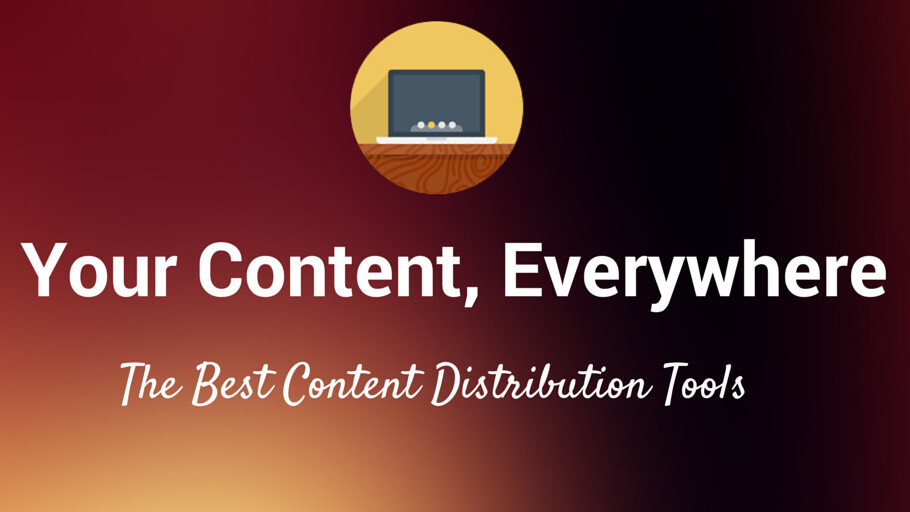
This post originally appeared on the Buffer blog.
When you’re creating useful, actionable, epic content, everyone deserves to see it.
So how do you get your hard work and effort seen by the largest audience possible?
We’ve considered that question often at Buffer, as we try to maximize our content so it reaches the people who need it. There are certain strategies you can put into place for spreading your content far and wide, and there are a good number of tools that can help these strategies run super smooth.
Here are the tools we use (and the strategies we love). Is there a tool you use that I failed to mention? Please do share it in the comments!
The 3 types of content distribution channels
Before we dive into the tools, let’s start with an overview of content distribution. Essentially, when you distribute your content, you do so in three basic channels.
- Owned
- Earned
- Paid
Owned media includes the channels that belong to you, where you control the content. This can be your blog, website, email newsletter, and social media profiles.
Earned media involves others sharing your content. This can take the form of social media shares, guest posts, media coverage, and product reviews.
Paid media is the exposure you pay for, be it pay-per-click ads, display ads, social ads, or otherwise.
When viewed in a Venn diagram, you can see that these channels provide a bit of overlap with one another as content distribution can touch on many different channels for the same piece of content.
With this idea framework in mind, let’s look at some tools that help accomplish content distribution in each of the three major distribution channels: owned, earned, and paid.
The 17 Best Tools for Widespread Content Distribution
Owned media
1. Buffer
We’ve found Buffer to be the simplest way to share your content to your social media channels on Twitter, Facebook, Google+, and LinkedIn. You can schedule your posts to publish at ideal times (or let Buffer decide when is best), and you can reshare older content by re-buffering straight from the app dashboard.
2. Edgar
A new tool for reposting content from your archives, Edgar helps with evergreen promotion by linking to your social channels and sharing old content at a regular drip.
3. WiseStamp
A complete, beautiful email signature that can contain the typical contact information plus a host of other social media, RSS, and content distribution tidbits. You can show your latest tweet or hook up your RSS feed to show your latest blogpost.
4. Goodbits
Create an email newsletter full of amazing links (including the content of yours you want to distribute). Goodbits lets you drag-and-drop content from a queue made up of any RSS feed you connect as well as any articles you add via the bookmarklet or browser extension.
You can then customize, edit, and send to your contacts, including your MailChimp list and segments.
5. MailChimp
Speaking of email newsletters, MailChimp is one of the biggest and best (and free) ways to send email to your list of contacts.
You can set up automated campaigns that deliver each new post that you write, or you can create campaigns from scratch. MailChimp offers free accounts for those with fewer than 2,000 contacts in their list.
6. SumoMe
The suite of tools offered by the SumoMe WordPress plugin helps considerably with owned media and earned media. For owned media, SumoMe offers list building tools that include a subscription scroll box, a signup bar, list popup and incentives/giveaways widget.
In terms of earned media, SumoMe makes it easy for others to share images on your blogposts as well as the posts themselves.
Earned media
This WordPress plugin allows you to lock a portion of your content behind a social share button so that the content can only be accessed once a user shares to Twitter, Facebook or Google+.
HARO lets you connect with journalists looking for a source. If you’ve got an expertise or experience in a certain area, you can sign up at HARO and a reporter could get in touch!
9. PR Newswire
Got something newsworthy to share? Consider going the press route. PR Newswire can help with distribution of news, announcements, and events to a variety of sources.
If you sign up, a rep from PR Newswire will get in touch directly to authorize your account and help with any press release promotion you need.
10. List.ly
Build a list about anything—resources for your niche, articles you love, helpful tools, recommended books, etc. Grab links from around the Web (including yours), and publish and share—and even embed—your list so that others can see.
11. Buzzstream
Buzzstream provides a host of services that assist with link building. You can find influencers in your niche who may want to share your content, and you can organize outreach efforts all the way from list building to measuring responses.
Outreach to fellow bloggers and influencers may require a bit of followup. With Boomerang, you can schedule your emails and automate follow-ups.
13. Contently
Writers, authors, and journalists can create a portfolio at Contently, which can then be viewed and shared by just about anyone—readers, social media users, and even potential employers.
The Contently platform helps connect content producers with those in need of content, and the service acts as a great way to distribute your own writing in one consistent place.
14. Storify
Collect content from across the Web—blogposts, tweets and more—and place it into a Storify page. We use Storify for recaps of our Bufferchats on Twitter. The service integrates all types of media from videos to articles and everything in between.
Paid media
15. Outbrain
Have you ever come across a series of links at the end of an article? Would it be cool to see your content there? You can sign up for this kind of service at Outbrain, which feeds related/interesting content to pages all over the Internet.
Similar services include Disqus, Taboola, Skyword, and SimpleReach. Contently did a great breakdown of the pros and cons (and costs) of these paid channels, and Powered By Search has a list of great options, too.
In a similar way to Facebook ads, you can pay to have your page’s posts seen by more users on the network. You can boost any post from your page and target the boost to reach a particular demographic of location, age, gender, or interest.
17. Promoted tweets
Like Facebook sponsored posts, you can get more views on your tweets by paying to promote a tweet to a larger audience. This occurs through the Twitter ads dashboard where you can compose an original tweet to promote or grab one from your stream that you’d like more people to see.
What a content distribution strategy looks like in practice
The next step is to synthesize all these tools and ideas into a single strategy. For many of us, the two free channels for content distribution—owned and earned—make for a huge number of possibilities on their own for getting our content seen and heard. Clement Vouillon put together a neat graphic that shows what this two-pronged approach could look like.
In a post at KISSmetrics, Shannon Byrne shared the owned and earned content distribution strategies for Mention. Here’s what their list looks like:
Do some of these sites and channels look familiar to you and your strategy?
For our Buffer content, we distribute along many of the same channels mentioned in the KISSmetrics blogpost (and we’re inspired to try several new channels that were mentioned, too!).
Among the channels we often hit when we have new content or announcements:
- Blogposts
- Infographics
- Email newsletter
- RSS email
- Facebook page
- Google+ page
- Google+ community
- Content suggestions in the Buffer app
- Syndication on Fast Company, The Next Web, Entrepreneur, and others
- Press outreach
- Medium
- Inbound.org
- Hacker News
- Product Hunt
- Storify
Which channels do you include in your content distribution strategy?
Conclusion
It’d feel great to get your content in front of as many people as possible, and there is certainly no shortage of tools, channels, and strategies to help make this possible. If you’re interested in paying for distribution, many sites and services can place your content in visible spots.
And if you’d rather not pay for any extra distribution, there are plenty of owned and earned channels to try.
Which tools and sites do you use for your content distribution? I’d love to hear how you do things! Feel free to share in the comments.
Read next: 44 best mobile apps and tools for marketers: How to manage social media from anywhere
Get the TNW newsletter
Get the most important tech news in your inbox each week.















